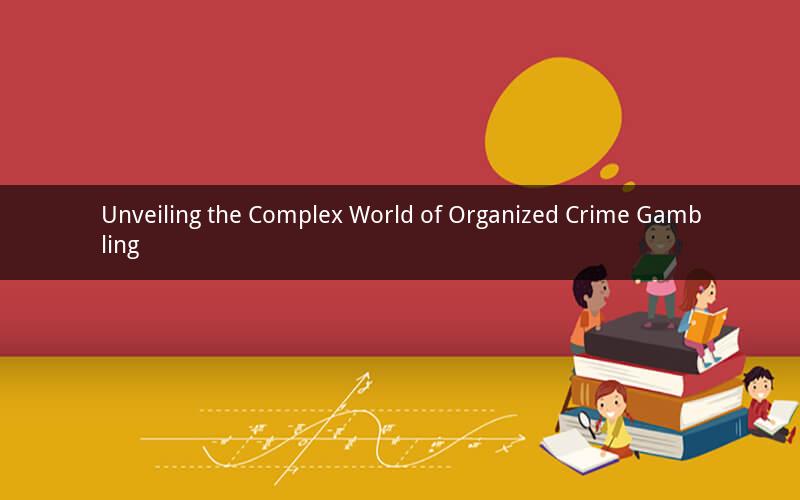
Organized crime gambling, a term that evokes images of clandestine meetings and shadowy figures, is a multifaceted issue that encompasses a wide range of illegal activities. It involves the use of gambling as a means to launder money, gain influence, and exert control over various aspects of society. In this article, we will delve into the intricacies of organized crime gambling, exploring its definition, history, methods, and impact on society.
Definition and History
Organized crime gambling refers to the illegal gambling activities conducted by organized crime groups. These groups often operate under the guise of legitimate businesses or organizations to mask their illegal operations. The history of organized crime gambling can be traced back to the early 20th century, with its roots in illegal gambling dens and prohibition-era bootlegging.
Methods and Techniques
One of the primary methods used by organized crime groups to engage in gambling is through the establishment of illegal casinos and betting shops. These establishments are often well-hidden and operated in secret, making them difficult to detect and shut down. Organized crime groups also use various techniques to ensure the success and profitability of their gambling operations, such as:
1. Bribery and corruption: Organized crime groups often use bribery and corruption to gain control over law enforcement and other government officials. This allows them to operate with impunity and avoid detection.
2. Money laundering: Illegal gambling provides an ideal platform for organized crime groups to launder money. They accept bets in cash and then use various methods to convert the money into legitimate assets.
3. Illegal bookmaking: Another common method used by organized crime groups is illegal bookmaking, where they take bets on sports events or other events of chance.
4. Cyber-gambling: With the advent of the internet, organized crime groups have increasingly turned to cyber-gambling as a means to conduct their illegal activities. They use sophisticated technology to create online casinos and betting platforms that are difficult to trace.
Impact on Society
Organized crime gambling has a profound impact on society, affecting various aspects such as:
1. Economic impact: Illegal gambling operations can result in significant financial losses for governments and individuals. These losses include tax revenue, as well as the money spent on gambling-related services and products.
2. Social impact: Organized crime gambling can lead to increased crime rates, as these groups often resort to violence to enforce their control. It can also result in addiction and other social problems, such as gambling-related debt and family breakdown.
3. Legal impact: The existence of organized crime gambling poses a significant challenge to law enforcement agencies, as they must navigate complex legal issues and develop innovative strategies to combat these illegal activities.
Challenges in Combating Organized Crime Gambling
Combating organized crime gambling is a complex and challenging task for law enforcement agencies. Some of the key challenges include:
1. Identifying and tracing organized crime groups: Organized crime groups are often well-structured and operate in the shadows, making them difficult to identify and trace.
2. Overcoming corruption and bribery: Law enforcement agencies must deal with the challenge of corruption and bribery, which can hinder their efforts to combat organized crime gambling.
3. Keeping up with technology: Organized crime groups are increasingly using technology to conduct their illegal activities, requiring law enforcement agencies to stay ahead of the curve and adapt their strategies accordingly.
5 Questions and Answers
1. Q: What is the primary motivation behind organized crime gambling?
A: The primary motivation behind organized crime gambling is financial gain. Organized crime groups use gambling as a means to launder money, gain influence, and exert control over various aspects of society.
2. Q: How does organized crime gambling affect the economy?
A: Organized crime gambling can have a significant negative impact on the economy, leading to financial losses for governments and individuals. It can also result in a decrease in legitimate economic activity, as individuals may spend more time and money on illegal gambling.
3. Q: What are the main methods used by organized crime groups to conduct illegal gambling activities?
A: The main methods used by organized crime groups include the establishment of illegal casinos and betting shops, illegal bookmaking, and cyber-gambling. They also use various techniques such as bribery and corruption to ensure the success of their operations.
4. Q: How can law enforcement agencies effectively combat organized crime gambling?
A: Law enforcement agencies can combat organized crime gambling by identifying and tracing the groups involved, overcoming corruption and bribery, and keeping up with technology. They must also collaborate with other agencies and countries to share intelligence and resources.
5. Q: What are the long-term consequences of organized crime gambling on society?
A: The long-term consequences of organized crime gambling on society can be severe. It can lead to increased crime rates, addiction, gambling-related debt, and family breakdown. It also poses a significant challenge to law enforcement agencies and can erode public trust in the legal system.
In conclusion, organized crime gambling is a complex and multifaceted issue that requires a comprehensive approach to combat effectively. Understanding its definition, history, methods, and impact on society is crucial in developing strategies to address this significant problem.